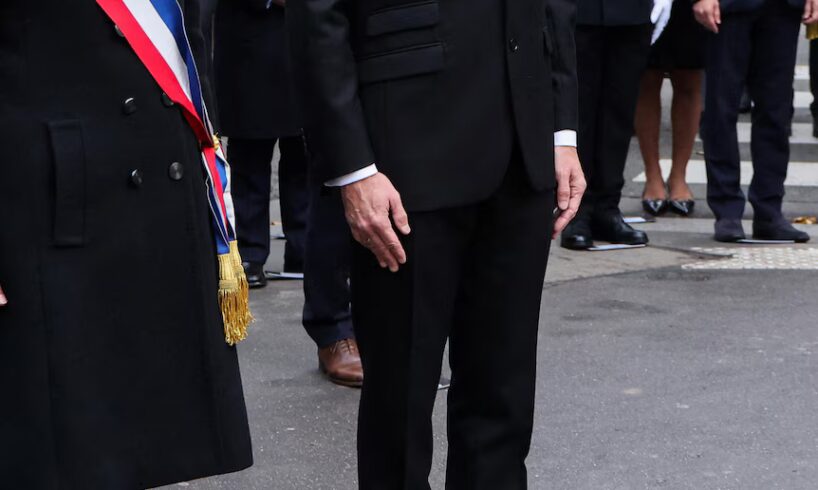
France paid an emotional tribute to the 130 people killed 10 years ago during a rampage by Islamic State gunmen and suicide bombers targeting cafes, restaurants and the Bataclan concert hall.
The attacks were the deadliest on French soil since World War Two, scarring the national psyche and prompting emergency security measures, many of which are now embedded in law.
The assault on November 13, 2015, began with suicide bomb blasts that killed one person, bus driver Manuel Dias, outside the Stade de France sports stadium where then-President Francois Hollande and the German foreign minister were watching a friendly soccer international, and continued with gunmen opening fire at five other locations in central Paris.
People gathered near the Eiffel Tower lit up in the colours of the French national flag. (Reuters: Michel Euler)
The commemorations will culminate with the inauguration of the “November 13 Memory Garden,” a new memorial garden opposite City Hall.
It is a stone enclosure from which granite blocks rise to evoke the attack sites, engraved with the victims’ names.
The Eiffel Tower has been lit in the colours of the French flag after nightfall and church bells have been heard across the capital, including those of Notre-Dame Cathedral.
They will continue to ring in the early evening in memory of what the city’s archbishop called “a long night of anguish”.
‘An emptiness that cannot be filled’
Man recounts Bataclan escape
“Since that November 13, there is an emptiness that cannot be filled,” Mr Dias’s daughter Sophie said at the ceremony, her voice trembling with tears as she recalled the family’s endless phone calls through the night, trying to reach her father, before they were told he had been the attackers’ first victim.
“The absence is immense, the shock is intact and the incomprehension remains. I’d like to know why, I’d like to understand. I’d like these attacks to stop.”
President Emmanuel Macron was among senior officials who paid their respects to Mr Dias and the other victims with a minute of silence and the laying of wreaths before the Stade de France.
“The pain remains. In solidarity, for the lives lost, the wounded, the families and loved ones, France remembers,” the president wrote on X.
Throughout the day Mr Macron, survivors and relatives of victims will honour those killed and wounded at each of the sites of the attacks.
At the second ceremony, officials and representatives of victims’ associations also observed a minute of silence in front of the Carillon bar and the Petit Cambodge restaurant in central Paris, after a list of the 13 people killed there was read out.
Victims’ associations say two survivors of the attacks later committed suicide, bringing the total death toll to 132.
Flowers and photographs of victims have been placed at the sites of the attacks across Paris. (AP: Ludovic Marin/Pool)
Attack on the Bataclan
Sebastian Lascoux was inside the Bataclan where the rock band Eagles of Death Metal were playing when what he thought was the noise from firecrackers pierced the concert hall. It quickly became apparent that the venue was under attack.
People “ended up all squashed together and collapsed as one”, he said last month. “And then (there was) the smell of blood,” said Mr Lascoux, now aged 46.
One of his friends was shot dead trying to shield another member of their party.
Mr Lascoux still suffers from post-traumatic stress and cannot be in crowded places or enclosed spaces, even cinemas. Loud pops remind him of gunshots.
“What made the November 13 attacks unique was that everyone was a potential victim,” historian Denis Peschanski said.
Victims’ associations say two survivors of the attacks later committed suicide, bringing the total death toll to 132. (Reuters: Christian Hartmann)
“Either they were old enough to be there, or, like me, they were old enough to have children who could have been there, even though I was lucky they weren’t.”
A decade on, the threat of such attacks in France has mutated.
Militant jihadist groups such as Islamic State no longer have the same means to coordinate attacks on French soil, security sources say.
But the group’s online propaganda is still effective and able to radicalise youngsters fascinated with violence on social media.
Anti-terrorism prosecutors this week launched a probe into the former partner of the presumed sole surviving perpetrator of the attacks.
Reuters/AP





